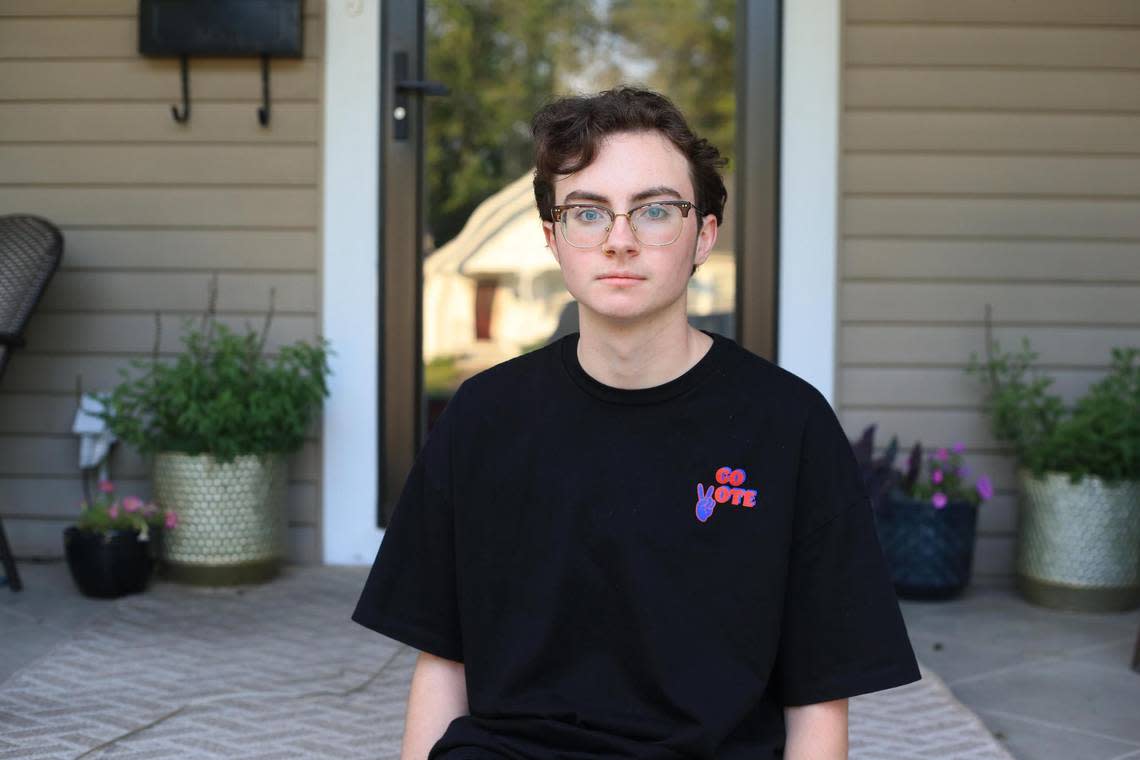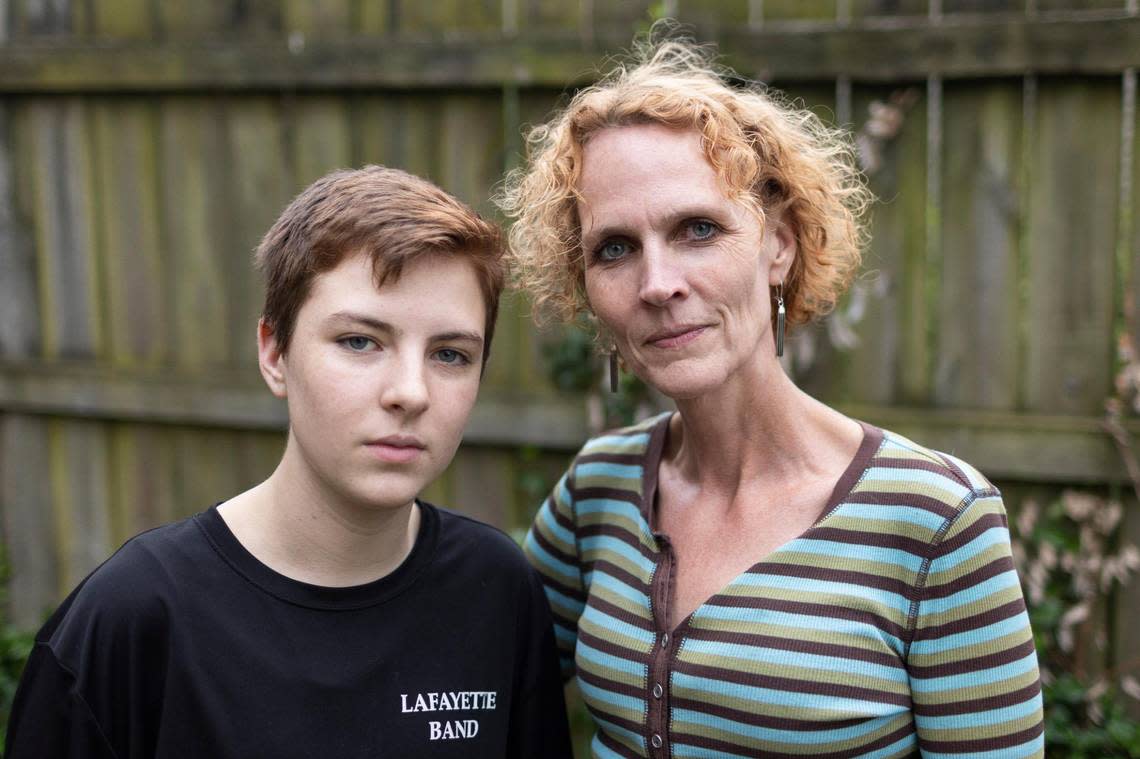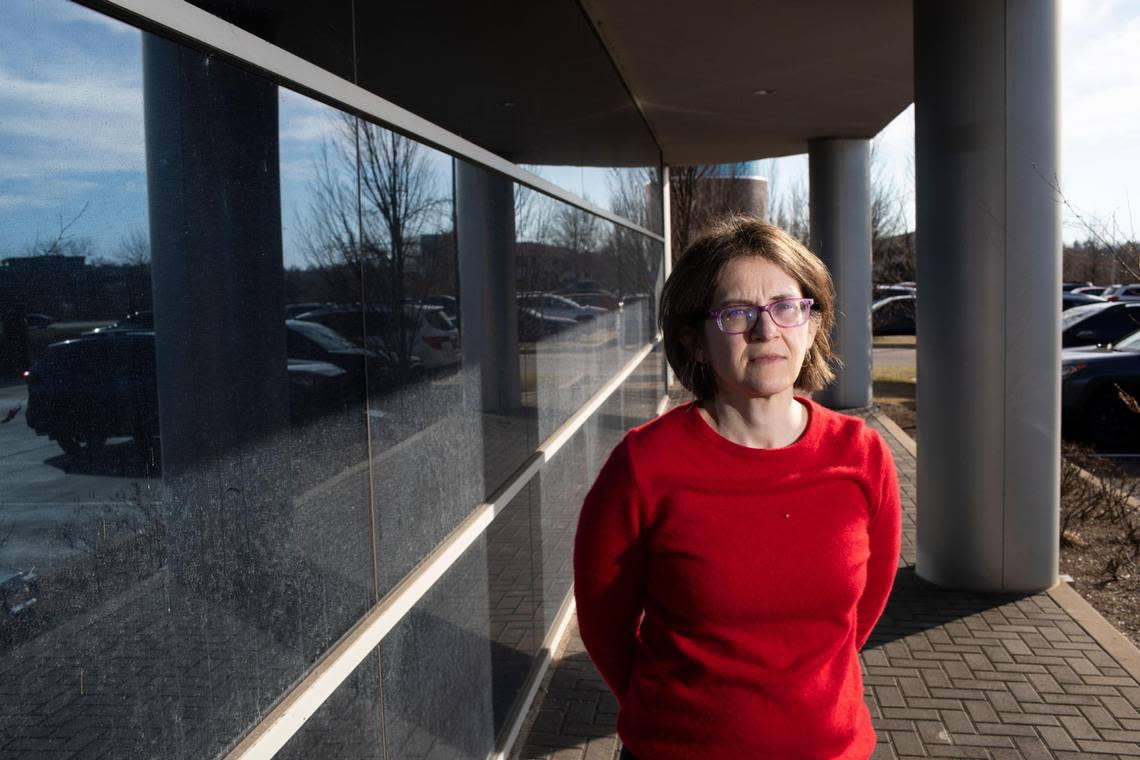Kentucky’s trans youth dread what state health care ban will mean for them. ‘I’m a human’
From an overflow room in the Kentucky Capitol Annex, Henry Svec, 13, listened to adults explain why kids like him needed to be protected from themselves.
Masses of people had joined Henry, crowding the halls of the Frankfort statehouse on March 2 to protest House Bill 470, a proposal to ban gender-affirming care for transgender youth in Kentucky. Up to that point, this type of health care, endorsed by major U.S. medical associations, was legal in the state. The standard of care for prescribing medication that’s considered gender affirming, such as puberty blockers, requires permission from a parent or guardian.
As lawmakers on the House Judiciary Committee heard testimony in favor of the bill, Henry watched the meeting unfold on a projector screen from a room down the hall. Dr. Roger Hiatt, Jr., an Arkansas child and adolescent psychiatry specialist who has publicly supported bills outlawing this type of health care in other states, called transgenderism a “psychiatric disorder.”
With a pastel blue, pink and white Trans rights flag draped around his shoulders, Henry, who stands about 5’5” with short hair and a soft smile, rocked in a leather committee chair behind the dais — a spot typically reserved for lawmakers deliberating bills. Packed with protesters, the crowd faced Henry and his allies sitting in the committee seats.
The next speaker was Dr. Andre Van Mol, a California-based family physician. He’s co-chair of the Committee on Adolescent Sexuality for the conservative-leaning American College of Pediatricians, designated a “hate group” by the Southern Poverty Law Center. In a 2019 online paper, Van Mol said trans-rights advocates were “eager to groom the next generation of victims.”
To the committee, he called gender-affirming health care “unproven child experimentation. Why permanently medicalize a condition for a child that usually goes away?”
Both men were invited to speak by lead bill sponsor, Waddy Republican Rep. Jennifer Decker. State law prevents parents from giving their underage children alcohol and cigarettes, she told committee members. Gender-affirming care is just as harmful, and trans kids need to be protected from adults who endorse their identity. “The state has a compelling interest in protecting children from decisions that cause irreparable harm,” she said.
Taught to respect his elders, Henry quietly considered what Decker, near the age of his grandmother, was saying.
If adult lawmakers believed that health care affirming the gender that feels most authentic to him was wrong and harmful, it must mean his trans identity was also somehow wrong and harmful. Otherwise, why would his doctor’s care be so damaging that it warranted a law banning it?

But it didn’t feel wrong or harmful to Henry, or any of the 13 families across Kentucky with a trans child the Herald-Leader has interviewed in the months since, each of whom will be directly impacted by some aspect of the new law.
“You’re supposed to respect adults, but some adults don’t respect kids. It makes me feel unrepresented,” Henry said after the meeting. “Maybe I’m just a kid, but I didn’t do anything to disrespect you. I’m a human, and part of my right is to be who I am.”
HB 470 passed out of committee and won approval from the Republican-controlled House that day. Within the month, most of the contents of that bill were repackaged into a heftier Senate Bill 150. On March 29, days after Democratic Gov. Andy Beshear vetoed the bill, the Republican supermajority General Assembly overrode his veto and made it law. It will take full effect June 29.
Not only does the revised omnibus bill outlaw gender-affirming care for teens like Henry, it restricts curriculum in K-12 schools about gender and sexuality. It also codifies into law a requirement that schools draft policies that force people like Henry to use restrooms and locker rooms corresponding with their gender assigned at birth, even if it veers from the identity their peers and teachers know them by.
Some trans kids told the Herald-Leader they are concerned this new policy will embolden the bullies at their schools. Others wondered why adults in Frankfort they’ve never met have a problem with their gender expression, when most of the teachers in their schools and adults at home willingly validate who they are.
Many of their parents are frantic, scrambling to find reliable access to prescription hormones or puberty blockers out of state. Others have called and emailed school administrators and counselors, nervous at the possibility their child will have to socially de-transition in front of their peers. At least one family is house shopping in Illinois as a direct result of this law.
All described a sense of powerlessness and fury at lawmakers for dictating to them how to parent their individual children. Many are territorial about the progress their family has made on a journey of acceptance that, for several, wasn’t an easy or linear one.
Now that enforcement of the law is imminent, each is grappling with what to do to ensure their children feel supported in a state they believe is hostile to their well-being.
“I don’t understand how my conversations with my child are being regulated by someone outside of the three of us,” Jessica Morris said of herself, her husband, and their youngest, 14-year-old Lucy, who’s non-binary and recognized as such throughout their student documentation in the Fayette County School system.
“At the end of the day, we’re trying to figure out how we as parents continue to love on and honor the journey they’re on as young humans,” Morris said. “How do we still support them, given what our state is doing?”
‘Just like everybody else’
Casper Hackney, 17, doesn’t use the bathroom while he’s at school.
A senior at McCracken County High School in Paducah, Casper’s schedule is split between his job at Walmart and the two remaining classes he’s finishing before graduation this month. That means he’s only physically required to be in the school building in the mornings.
“I just try to avoid it all together,” said Casper, who describes himself as trans and gender queer.
The decision is less for his sake and more for his classmates. Wanting to blend in and avoid any awkward interactions with people who might approach him with hostility, Casper quietly sacrifices his daily comfort for the sake of others’.
He’s gotten so accustomed to avoiding school restrooms that Casper has mapped out alternative stores in town with single-stall restrooms if he can’t wait until he gets home. At Walmart, “there’s a family stall bathroom, and I know a few other stores nearby that have single-stall bathrooms I feel comfortable using,” he said.
He first told his parents he was gender queer at 11. When he was 16, lacking a specialized provider anywhere near his home in west Kentucky, Casper and his mom, Amy, began driving two hours south to the transgender clinic at Vanderbilt University Medical Center. in Nashville.
There, after involved conversations with specialists, Casper began taking testosterone. His Nashville doctor calls in the prescription to his local pharmacy monthly, and his mom helps him administer the shot once every two weeks. Every six months, they’ll make the two-hour trek so Casper can have his blood drawn to make sure the testosterone isn’t causing any adverse side effects.
The care Casper has received at Vanderbilt has been life-changing, both he and Amy agreed. Even just to have his identity validated by a doctor makes him feel less alone. That means something. In his community of just under 30,000, Casper lacks the broad peer support network other teenagers interviewed for this story have in Lexington and Louisville.
“I’m the only person I know, minor or adult, who is actively medically transitioning in the state of Kentucky,” he said.

Tall and lanky with short hair and a dimpled smile, Casper presents more androgynously and doesn’t quite fit into either male or female binary. He’s OK with that, but it makes it harder for him to blend in with his peers.
“I’m already very scared of going out by myself, because I know I don’t pass in either direction — I don’t look like a woman and I don’t look like a man,” he said. At school, he notices how some students stare. Casper can often overhear their chiding comments to one another. “I know there’s people that talk about me, because they don’t try to hide it; I can literally hear the words they’re saying.”
Casper turns 18 in August, barely escaping enforcement of the ban on people who aren’t yet legal adults. But his access to the prescription he’s taken for close to two years is being cut off in the meantime. With Tennessee’s recent passage of a similar anti-trans law, he was notified last Wednesday his most recent prescription would be his last.
“Our team understands the increased distress and psychological needs of you and your family during this very difficult time,” Vanderbilt Healthcare wrote in a May 17 email to patients, notifying them that all gender-affirming medical care for minors had abruptly ended.
Kentucky and Tennessee’s new laws not only cut off his access to a medication that he and his mom agree has helped him markedly. But Casper also worries about the impact the new policy will have on many of his peers, who already malign him for being different.
“I’m worried they’re going to take this as an affirmation to continue that kind of behavior they know isn’t acceptable,” he said.
This is a legitimate worry, said Shannon Wyatt, a psychotherapist in Lexington with more than two decades of experience. She worries the new law will push trans kids to trust themselves less and people who wish to do them harm more.
“By denying gender exploration or forcing a child to de-transition socially or medically, we are saying to these kids, ‘you do not have control over decisions about your body, and you are only allowed to show the parts of yourselves that make other people comfortable,’” she said. Over time, “they begin to mistrust their own intuitive sense of what is true and right for them, and make decisions instead on what others find acceptable.”
Four years earlier, in the eighth grade before he came out to his parents, Casper was hospitalized for nine days during a mental health crisis.
“He felt like there was no way out, and he was going to take his own life,” Amy said. She found out later that part of what was fueling those thoughts was acute dread that he wouldn’t be accepted. Now, she said, the state is “basically saying your existence is invalid,” she said. “You’re just further alienating them and furthering their mental instability because they can’t be who they want to be.”
For Amy, who’s 48, seeing her child explore self-harm because he was deeply afraid of rejection radicalized something in her.
“It paralyzes you with fear,” she said. “You become acutely aware of how fragile someone’s psyche can be, and you want to do anything you can to protect your child.”

Last year, during her first month on the job working in project controls at a nearby power plant, she overheard her coworkers, all men, remarking on someone whom they “couldn’t tell” was a man or a woman.
Her ears pricked. She thought of Casper, and imagined people snickering at him for the same reason.
“I have a transgender son,” Amy blurted aloud to the group. They quieted. “Sometimes he dresses more androgynous, sometimes not. Typically if you just ask the person (how they identify), they won’t mind telling you.”
Reflecting last month on that interaction, Amy said her role now is advocate.
“I’m the mom of a trans son, so I just took a few minutes to say something. Once you acknowledge it, it veins out: ‘oh, you have a child who’s trans? You’re a good person, you’re educated, you have a good job, so your kids must be good kids,’” Amy said.
“I think sometimes people think that if your child is different, then that parent has led them down that path, or there’s something wrong with the family. But we’re all just like everybody else.”
‘It’s normal and OK’
Milo Calloway, 16, told his close friends he was trans on a Zoom call during the COVID-19 pandemic.
Though his disclosure to the wider world was a long time coming, he’d first told his older sister, Natalee, in the fourth grade. “We shared a room at the time, and we were getting ready for bed one night and he just told me, ‘Sometimes I feel like a boy,’” she remembered.
A high schooler at the time, she helped him find the language to describe it.
“She told me that was a thing, it’s called transgender,” Milo said. “She had some friends in high school who were trans and she gave me some people on social media to follow who were out and talked about it. It was kind of my first outlet. It really showed me that this is a thing, and it’s normal and OK.”

From there, Milo’s self-expression solidified: he cut his hair shorter and embraced dressing more traditionally masculine, but nothing much changed beyond that. During his freshman year, he asked his dad, Patrick, to call him by the name Milo, and to please use male pronouns when referencing him. Patrick, who grew up southern Baptist and still considers himself a Christian, struggled to accept his son’s identity at first.
“I doubted that being trans was a choice,” Patrick admitted. But after having observed Milo’s consistent identity for a handful of years and doing research to better understand what it means to be trans, it was an easy request to fill.
“It’s not just a fad. You can see in his eyes that he is who he is,” Patrick said. “With that, how can you not support that kid like every other kid? You want them to have an easy life and to be treated equally. Normal, to everyone else — that’s what Milo wants, to be treated normally.”
More than a year before lawmakers proposed House Bill 470, Patrick tried to schedule Milo an appointment at Cincinnati Children’s Transgender Health Clinic. Milo began the intake process, but he was eventually denied last July as a new patient because he’s on Kentucky Medicaid, Patrick said. Even if they’d opted to pay out of pocket or with private insurance, “they told us they weren’t accepting new patients.”
Cincinnati Children’s did not respond to questions about whether its clinic has stopped taking new patients from Kentucky.
On the cusp of adulthood, Milo knows he wants top surgery — a procedure to remove his breast tissue — after he turns 18. Patrick’s aim is to find Milo a therapist until he’s able to receive the gender-affirming care that will soon be illegal in Kentucky, Tennessee and likely Ohio. In the meantime, Milo is scheduled to see his primary care physician in July, and hopes he’ll provide recommendations of where to travel for care outside of his tri-state region.
Over the last two months, Natalee has watched her younger sibling try to understand how much harder being normal is about to become. For her, there’s a futility in assuring Milo it’s all going to be OK.
“That’s probably the worst feeling,” she said, “just trying to find the words to provide comfort and knowing there’s not really anything you can say, because there’s not anything you can do to change it.”
‘I can’t change who I am’
Kelly Bolte was selling pull-tab bingo tickets for a Lafayette High School band fundraiser when she learned Senate Bill 150 had passed for good.
Kelly, 50, blankly looked up from her station and made eye contact with her son across the room. He could tell something was wrong. She waited until the car ride home to tell him.
When Henry came out two years ago, the adults in his life were encouraging, even in the face of uncertainty. A close friend of his mom’s offered to help buy him a new wardrobe. His teachers at SCAPA at Bluegrass in Lexington went out of their way to make sure the school’s bathroom accommodations worked for him. His parents celebrated with him when they, together, legally changed his name last year.

When Henry began seeing a therapist soon after he first disclosed to his parents he thought he might be trans, he’d received a clean bill of health: no diagnosable clinical anxiety or depression.
And when Henry and his parents had begun seeing Dr. Keisa Fallin-Bennett at the University of Kentucky’s Transform Health Services a year after he came out, it had seemed as commonplace as any other pediatric doctor’s visit. No adults close to him made him feel like his gender expression was ill-advised or toxic. Henry never felt coerced by a doctor to obtain any sort of gender-affirming care, nor did his mom, or his dad, Jamie Svec, all three told the Herald-Leader.
About a year after coming out, after talking with his doctor, Henry began binding his breasts. Once his period began aggravating his gender dysphoria, he was prescribed a Nexplanon implant. A common form of birth control, it helps taper his periods, which in turn calms his dysphoria. In Kentucky, a person under age 18 can obtain contraception without parental consent. Henry frets, for his unique gender-affirming health care needs, the new law will flatly deny him access to medication he, his family and his doctor say benefits him, simply because he’s trans.
Henry never took puberty blockers, and isn’t on testosterone. But hormone therapy is an ongoing topic of discussion between Henry and his care team. Typically for a trans kid, it’s best to experience puberty at the rate the rest of their peers do, Fallin-Bennett told the Herald-Leader.
For Henry, a rising freshman, beginning testosterone in his sophomore year will likely make the most sense developmentally, lessening the chance for emotional strife at being othered by going through puberty earlier than his friends.
But the new law bans the use of testosterone for this purpose.
Fallin-Bennett likened forcing doctors not to provide the standard of care treatment for trans youth, which this law does, to “forced malpractice and medical negligence.”
The standard of care is “carefully considered gender-affirming care,” she said. “That means mental health, puberty blockers and hormones. They’re not all for every person. But (all options) are carefully considered, and it’s a very important part of treatment for many people.”

At their April 5 appointment, Henry and his parents were given a print-out list of out-of-state clinics that could offer the care Kentucky would soon outlaw. Cincinnati Children’s Transgender Health Clinic is the closest. But a similar bill moving through the Ohio Legislature, dubbed the Saving Adolescents from Experimentation (SAFE) Act, which seeks to ban gender transition services for minors, will likely jeopardize that access.
Cincinnati Children’s refused to make a doctor available for an interview, or to answer questions about whether the care they provide to underage Kentuckians, including from a location in Crestview Hills, will be impacted.
In an April 21 statement, the hospital said, “Today, transgender minors can receive evidence-based, gender-affirming care in Ohio from a provider with an Ohio license. We believe all transgender and gender diverse young people should have access to comprehensive, developmentally appropriate, gender-affirming medical care provided in a safe and inclusive environment.”
The other closest clinics to get hormone therapy, Henry’s doctor told him, are St. Louis Children’s Hospital, a five hour drive from Lexington; the University of Michigan’s C.S. Mott Children’s Hospital, a five-and-a-half hour drive; and Penn State’s Gender Health Program, a nearly eight-hour drive.
“We will figure out a way to care for him, as him,” Jamie has assured Henry, even if that means trekking to another state. But that route is becoming much more logistically complicated and likely expensive.
As the parent of a trans kid, Kelly said, she tries to avoid letting this new reality overwhelm her, because it’s likely to. Losing her son’s access to gender-affirming health care feels like to losing one of his basic needs.
“I think it would be similar to not being able to feed your kids,” she said.
Almost three months after Henry visited Frankfort in protest, his summer break is here.
Maybe it’s because his final year in middle school was wrapping up, maybe it’s because it’s increasingly clear what’s coming down the pike, but in the weeks since, Kelly can tell her youngest is stressed.
“Henry’s kind of going through a rough patch, to be honest,” Kelly said over the phone in early May.
For the last month or so, he’d been more withdrawn and mopey. When his stress and anxiety peaks, though he might not explain why, he’ll ask his mom for more hugs. That has been happening more lately. Recently, he started seeing the school counselor.

Shortly after Henry watched lawmakers pass HB 470 that day in early March, he wrote a poem. In late April, Henry read it aloud onstage, in front of his school, at his eighth-grade showcase marking the year’s end.
“I have to live with me now,” Henry said into a microphone. “Right now, in the moment. In this breath. Breathe in what I like. And breathe out what I don’t. Because I can’t change it. I can’t change me right now . . . And as long as I am in this body, the wrong one, I don’t know if I’ll ever like me.
In fact, there are times where I’m pretty sure I hate me. This body isn’t natural . . . Why do I have to be so difficult? Why couldn’t I just be normal? Why couldn’t I convince my mind that it was wrong? Wrong when it looked in the mirror and saw a boy.
But I am a boy . . . I want to build my new body as if it were tailored to fit me. Then maybe I wouldn’t be so uncomfortable. Uncomfy when I stand. Uncomfy when I walk. Uncomfy when I lie down. Uncomfy when I sit. As if my skin is too tight, choking me.
I wish I could change me. Change me to fit. But I can’t. So as long as I can’t change who I am, I will try. Not to like me, but to be me as best I can. Because that’s all I can do in this moment.”
